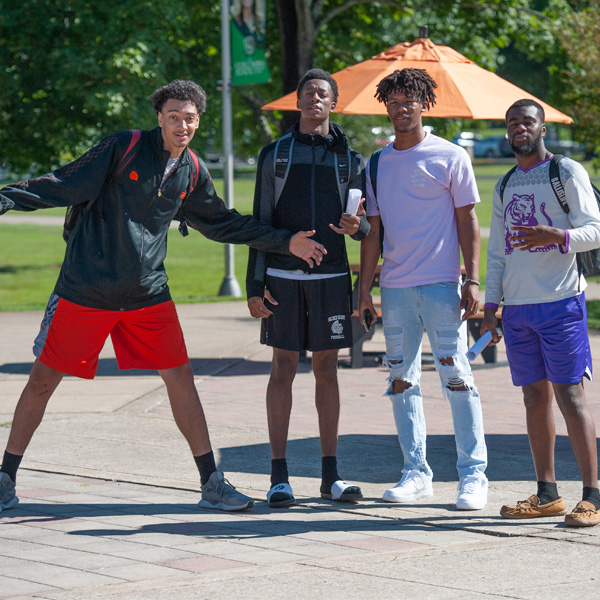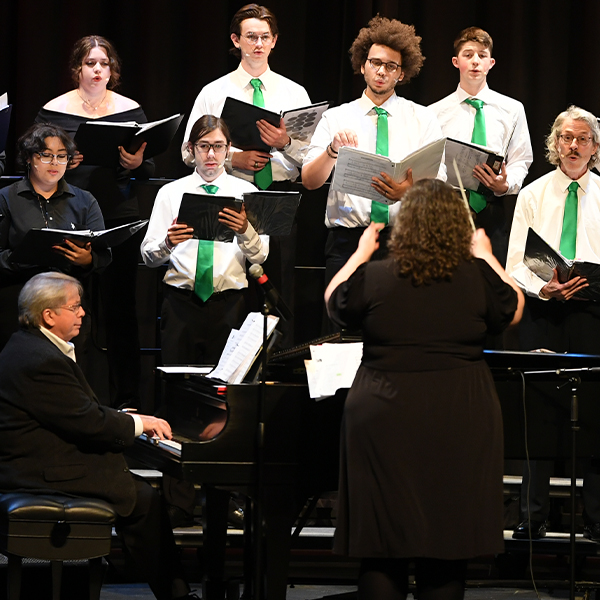Science & Math Leads Students Down Successful Career Paths
STUDENTS IN PURSUIT OF PROFESSIONAL PROGRAMS START SUCCESS PATHS AT COLUMBIA STATE
Science and Math Path Leads to Great Careers
During the 2009 academic year, several students at Columbia State began final preparations to transfer to four-year colleges and universities offering degrees in engineering and other professional programs, such as chemistry and physics. David Cooley (pictured right), Cyrus Niccore, Jay, Perry, Bobby Saye, Cory Searls (pictured left), Kevan Vernon, and Justin Watson were prime examples.
"I've chosen to pursue chemical engineering because it offers a challenging and in-demand career," said Searls, who plans to transfer to Tennessee Technological University.
"All pre-professional programs, involving engineering, chemistry, physics, dentistry, and medicine require certain levels of mathematics, chemistry, biology, and physics courses" reports Dr. Glenn Hudson, assistant professor of math at Columbia State. "The problem is that, during the last decade in the United States, fewer students have been taking the harder programs and courses, even though there are significant career benefits to those fields."
There can be any number of reasons some students choose to bypass certain classes, however many of those students can probably relate to former Columbia State engineering student Kevan Vernon. Vernon, like many students, had some struggles in high school with understanding some of the subject matter presented in classes like chemistry or physics. However, he found that he understood the subjects better in college. "Chemistry was for me a surprise enjoyment more than anything," said Vernon, who transferred to Tennessee Technological University. "At Columbia State the explanations were clear and Dr. (B.I.) Naddy (professor of chemistry) was always willing to stay and help anyone who asked. Many days seemed rough, but I think it's having difficulties and overcoming them that create a positive outcome."
According to www.careertoolkits.com/engineering, there are more than 25 official engineering specialties including mechanical, electrical, environmental, and chemical. Engineers fresh out of college typically make more than most other fields in liberal arts and business, and they can expect to earn a starting salary in excess of $40,000. The average salary in the U. S. for an engineer is about $65,000. Engineers are found in many different industries, including: manufacturing, construction, environmental, hospitals, research facilities, transportation and public utility companies, government, and power plants.
"After graduating with my bachelor's degree, I had a job before graduation with an environmental consulting firm in Nashville and have also worked as a city engineer for two prominent cities in Middle Tennessee in the years that followed," said Richard Hardison, a Columbia State and Tennessee Tech University alumnus.
Hardison credits his upbringing with influencing his career decision "I grew up working on the family farm and loved solving issues that we had with building roads and barns, and placing drainage tiles, etc.," said Hardison. "I knew civil engineering was right for me and wanted to work in the design of public utilities or consulting."
Hardison currently works at Columbia State Community College where he is the associate professor of mathematics.
"Given the current situation, the faculty and administration of Columbia State are increasing efforts to address these fields - we are committed to sustaining the programs so that students from our service region have options to pursue degrees in those fields regardless of their background, schedule, or economic background," explains Dr. Linda Horner, director of the Division of Science and Mathematics at Columbia State. "We want to work to interest more students to take the more difficult path and engage them in potential careers that will be rewarding to them as well as to our industries and communities. Columbia State offers mathematics, physics, and chemistry courses that lead to engineering and other professional degrees to students in the service region to allow them to have the opportunity to pursue a degree in engineering, medicine, scientific research, teaching, and so on."
Dr. Horner points out that an article in www.engineeringchallenges.org/cms/7126/7639.asp indicates that the United States is not producing an adequate number of professionals to compete globally in engineering and technology. She states, "The pre-engineering and scientific fields are a cornerstone of the academic excellence sought by Columbia State Community College and will help the region and country in improving the number of scientists and engineers that are needed to maintain and improve the life of our citizens."
For more information about Columbia State's professional programs in pre-engineering and other scientific fields, contact the Science and Math Division at (931) 540-2710 or visit the web site www.columbiastate.edu/science-and-mathematics-division.
Columbia State is a two-year college, serving a nine-county area in southern Middle Tennessee with locations in Columbia, Franklin, Lawrenceburg, Lewisburg and Clifton. As Tennessee's first community college, Columbia State is committed to increasing access and enhancing diversity at all five campuses. Columbia State is a member of the Tennessee Board of Regents, the sixth largest higher education system in the nation. For more information, please visit www.columbiastate.edu.







